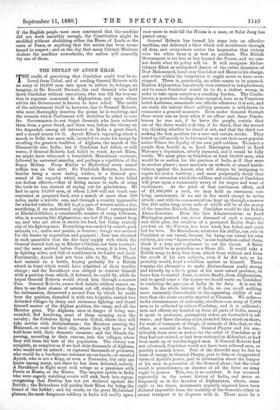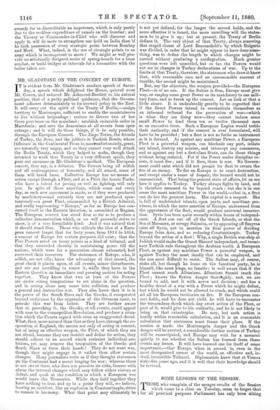THE DEFEAT OF AYOUB KHAN.
THE credit of perceiving that Candahar could best be re- lieved from Cabal, and of sending General Roberts with an army of 10,000 men into space to relieve it, belongs, we imagine, to Sir Donald Stewart, the cool General who held down Candahar without executions, who was till the evacua- tion in supreme command in Afghanistan, and upon whose advice the Government is known to have relied. The credit
of the achievement itself is, however, due to General Roberts, who most thoroughly deserves the praise he is receiving, and the rewards which Parliament will doubtless be asked to con- fer. Governments do not forget Generals who have relieved them from a great dread, and there was, before the victory on the Argandab, among all interested in India a great dread, and a sound reason for it. Ayoub Khan's vapouring about a march to Delhi was mere talk, intended to rouse his troops by recalling the greatest tradition of Afghans, the march of the Ghaznavide into India ; but if Candahar had fallen, or still worse, if General Roberts had failed to crush Ayoub Khan, we might have witnessed a formidable Mussulman outburst, followed by universal anarchy, and perhaps a repetition of the Sepoy Mutiny. From Khelat to Hyderabad every armed ruffian was on the alert. Sir Frederick Roberts, however, besides being a most daring soldier, is a General pos- sessed of the capacity which seems recently to have failed our Indian officers,—that of fitting means to ends, of using the tools he has, instead of crying out for grindstones. He had to carry 10,000 men, of whom 7,500 will not touch con- centrated or prepared food, over a march of more than 300 miles, under a terrible sun, and through a country impassable for wheeled vehicles. He did it, at a pace of sixteen miles a day, sacrificing, if we understand aright the Times' correspondent at Khelat-i-Ghilzai, a considerable number of camp followers, who, in a country like Afghanistan, are lost if they cannot keep up, and who are often in straits for food, but losing scarcely any of his fighting men. Everything was carried by camels, pack animals, i.e., mules and ponies, or bearers ; forage was secured for the beasts by requisition and payment ; flour was obtained in such quantities that the five days' supply with which the General started had, up to Khelat-i-Ghilzai, not been touched ; and the army arrived before Candahar, weary, it is true, but in fighting order, and full of confidence in its leader and itself. Fortunately, Ayoub had not been able to fly. The Ghazis had insisted on a battle, hoping probably for a British attack in front which would have admitted of their terrible charge ; and the Barukhzye was obliged to content himself with a position from which, if defeated, he could fly, while he hoped General Roberts would attack him through a narrow Pass. General RTher ts, aware thai Asiatic soldiers cannot en- dure to see their chance of retreat cut off, waited three days for information, discovered a second Pass by which he could turn the position, threaded it with two brigades, carried two defended villages by sharp and strenuous fighting, and found himself master of the Afghan position, the camp, and all the Heratee guns. The Afghans, once in danger of being sur- rounded, fled headlong, most of them escaping even the cavalry ; the Cabulees flying towards Cabul, where they will take service with Abdurrahman ; the Heratees crossing the Edmund, en route for their city, where they will have a bad half-hour with their domestic enemies ; and the Ghazis dis- persing, according to their custom, into the villages, where they will form the best of the population. The victory was complete, as complete as if we had slain thousands of Afghans, who would not be missed ; or captured thousands of prisoners, who would be a burdensome nuisance on our hands; or arrested Ayoub, who is not a King, or even a Pretender, but only one leader among many, and since he has been defeated, nobody. A Barukhzye in flight must seek refuge as a pensioner with Persia or Russia, or the Khans. The unquiet spirits in India who were eagerly watching events will sink back into repose, recognising that Destiny has not yet declared against the British ; the Beloochees will pardon their Khan for being the friend of the Infidel ; and far south, on the great Hyderabad plateau, the most dangerous soldiery in India will tacitly agree once more to wait till the Nizam is a man, or Salar Jung has passed away.
General Roberts has turned his army into an effective machine, and delivered a blow which will reverberate through all Asia, and everywhere revive the impression that victory over the white faces is at best an accident. The British Government is set free at last beyond the Passes, and we can- not doubt what its policy will be. It will recognise Abdur- rahman Khan as undisputed Ameer of the entire dominion of Dost Mahommed, hand over Candahar and Herat to his charge, and retire within the boundaries it ought never to have over- stepped. There is, practically, no other course to be pursued. Eastern Afghanistan has already been restored to independence, and to annex Candahar would be to do a violent wrong, in order to take upon ourselves a crushing burden. The Canda- harees, a powerless trading class excepted, hate us as Venetians hated Austrians, assassinate our officers whenever it is safe, and are ready the instant direct military pressure is withdrawn to commence a general massacre. Even under General Stewart there never was an hour when if an officer met three Canda- harees he was not, if he knew the people, certain that one of the three would stab him if he dared, that the second was thinking whether he dared or not, and that the third was seeking the best position for a sure and certain stroke. They hated us, till merely to be favoured by us cost their most popular native Prince the loyalty of his own paid soldiers. To annex a people thus hostile is, as Lord Hartington hinted to Lord Waveney's deputation, utterly immoral, and it would be folly beside. We must place in Candahar at least 10,000 men, who would be as useless for the garrison of India as if they were in another planet ; must maintain an attitude of armed watch- fulness against the Ameer, who will always be intriguing to regain his stolen territory ; and must perpetually dread that policy of extension which the soldiers and civilians of Candahar will press upon a community weary of its torpor and want of excitement. At the price of that continuous effort, and of £1,500,000 a year, we may hold an enormous out- lying cantonment, of no use in the world except to invite- attack ; and with its communications kept up through a narrow line 200 miles long, every mile of which will be at the mercy of the tameless Belooch clans. Candahar would be the Indian Alsace-Lorraine. Even the late Administration, as Lord Hartington pointed out, never dreamed of such a conquest ; and their plan, the creation of a protected Native State de- pendent on the Viceroy, has been tried, has failed, and must fail for ever. No Mussulman, whatever his ability, can rule in Candahar as our vassal, because for being our vassal his own soldiery, his own " house-caries," as our forefathers called them,, think it a duty and a pleasure to cut his throat. A Salar Jung would be as powerless as a Shere Ali. It would take a
British army to keep him from attack from without and from the revolt of his own subjects, even if he did not, as he probably would, head a rebellion against us himself. There remains the alternative to make Abdurrahman really strong and friendly by a fre,..11 grant of his most valued province, to-
leave him to control aerat, to retire, finally, from Afghanistan, and to spend some the money we should waste on Oandahar in rendering the garrison of India fit for duty. It is not fit now. In the whole history of India, we can recall nothing more eminently discreditable to the organising ability of our race than the scene recently enacted at Chaman. We order—, under circumstances of extremity, recollect—an army of 7,000 men to be collected to relieve Candahar, and it is collected ; men and officers are hurried up from all parts of India, money is spent in profusion, peremptory orders are forwarded to ad- vance ; and there the army stays, stranded like a shark on shore, for want of transport, of forage, of animals, of this, that, or the- other, as essential as breath. General Phayre and his con- siderable force were as useless for the relief of Candahar as if they had not existed, or had been stationed at Aldershot, or had been made up of wooden-legged men. If General Roberts had not advanced, Candahar would not have been relieved now, or possibly a month hence. Part of the discredit may be due to want of energy in General Phayre, part to false or exaggerated views of Ayoub's power, part to information about the temper of his men in possession of the General alone ; but the total result is powerlessness, an absence of all the force an army ought to possess. This, too, is no accident. It has occurred repeatedly in the recent history of India, and never do frequently as in the invasion of Afghanistan, where, some eight or ten times, movements urgently required have been declared impossible from the inability of the Generals either to secure transport or to dispense with it. There must be a remedy for so discreditable an impotence, which is only partly due to the reckless expenditure of camels on the frontier ; and the Viceroy or Commander-in-Chief who will discover and apply it, will do more to strengthen our hold on India than if he took possession of every strategic point between Bombay and Merv. What, indeed, is the use of strategic points to an army which is incompetent to move ? We might as well pro- vide an artistically designed series of spring-boards for a lame acrobat, or build bridges at intervals for a locomotive with the boiler taken out.



































 Previous page
Previous page